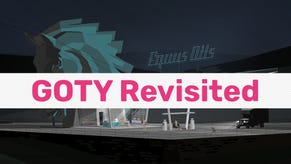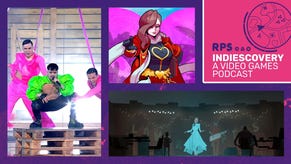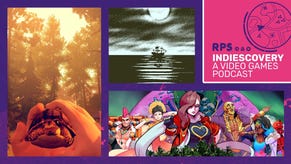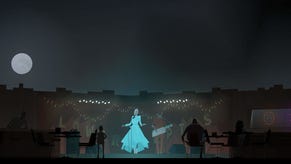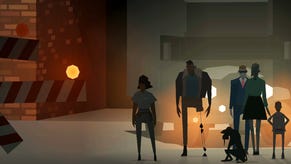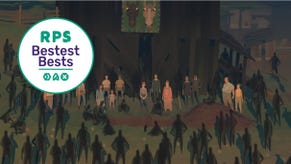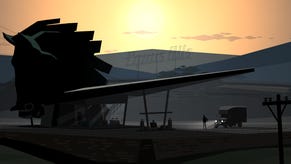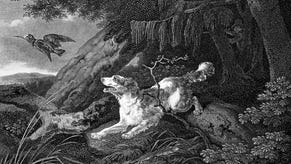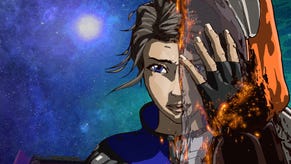The Amazing & Astonishing RPS Advent Calendar: Day 24
GAME OF THE YEAR 2013
This is it. The 24th door. The panel behind which every developer on Earth desperately hopes to be. Last year it was Far Cry 3. In 2011 it was Skyrim. 2010 saw Minecraft grab it, 2009 went to Dragon Age, in 2008 it was World Of Goo, and the very first was Portal in 2007.
So what is it this time? Did you guess?
It's Kentucky Route Zero!
John: We surprised ourselves with this one. Looking back, while indie games have as much of a chance of occupying our top spot as anything mainstream, there's still a sense of our previous picks being guessable. Far Cry 3 perhaps threw people, despite its being undoubtedly the right choice along with its many faults. But this is the one that even we weren't expecting to realise should be here. This has been an extraordinary year for games, and especially indie games. Just so much that's been interesting. But it's also been a year without that one uniting blockbuster. 2013 hasn't offered us a Minecraft, or a Skyrim. In fact, 2013 has been packed with more people playing Minecraft and Skyrim than ever before. But I've preferred this year for it. This is the year of Papers Please, The Stanley Parable, Proteus and Brothers. This is a year where eighteen out of twenty-four of our favourite games have been independent. And in the Leftovers entries appearing over the next few days, even more of them that could have made the cut. We have been so blessed with so much that's so novel, inspired, and thoughtful, rather than bombastic, epic and built of spectacle. And it's in a year like 2013 that a game as brilliant, as stunningly written and crafted as Kentucky Route Zero so entirely deserves the top spot.
The writing dazzles me. The prose, especially. It has the pace, the life, and the dexterity of a great literary novel, delivered with utter nonchalance, and indeed irreverence. It switches between sentences that are just sublime, to deliberately bad jokes, or spoofed purple prose. It says, "I can be this good, but I'm also going to be this too." And it's all a part of KRZ greater whole: an endless sense of unease, of instability in the very fabric of reality. A game that veers between the crushing sadness of abject loneliness, to office floors occupied by bears, as people, objects, sentiments and purpose drift in an out of existence. It's far, far cleverer than I am, and I love being adrift in that, dragged along by its flow, grasping what I can grasp.
Then with this, it's beautiful. Breathtaking, in relative simplicity. And oh sweet joy, simplicity that isn't made of cubes. Indeed, it's made of lines. Sometimes crafted into paintings I would hang on my wall, sometimes the barest scratches of white on a black screen, and heck, sometimes even text adventure. Then layer that with Ben Babbitt's exquisite score, and you have something incredibly special.
2013 saw the first two chapters of five come out - are people going to be annoyed we've given the number one spot to an incomplete game? It's tough, because we have. Could we end up giving it 2014's as well? I guess it's plausible. Let's see what betters it in the next year. In the meantime, I'm so delighted that such a wonderful game is here on Christmas Eve. I'm even more delighted that Jim ended up pitching for an adventure game to be in the top spot! What a day. But that should hopefully give you an idea of quite what a game this is - one that can even draw in genre-haters to the point of loving it more than everything else. That's quite a thing.
Jim: I can't fucking believe it. Jesus Christ. I am backing a point and click adventure for Game Of The Year. Something cosmically, fundamentally wrong must have happened for this to be true. And true it is.
As we composed this list, the realisation that Kentucky Route Zero was the game of the year appeared at the back of my mind. It sat there patiently, waiting for me to notice it. And I did, but then walked past, pretending I was doing something else, and then came back with a grand double take. There it is. The choice. And okay, yes, this game is really something. It matters. Let me try and take a stab at why. Because I have to explain this most peculiar of circumstances.
One reason for KRZ's success is that it works so well as the kind of game it is trying to be. It is a careful adventure, with a dreamlike story, an easy and comprehensible interface, and a sort of casual, impossible-to-capture cool in its look and sound. It's unintimidating, but coloured with something sinister. A sense of unease. It is a game that it's easy to hang out with, to spend some time clicking through and admiring, a game that you might show to a knowing friend. Hey, this looks cool, it seems interesting. Yeah?
Yeah.
And then you begun to unpick the elements of why it is so competent, and why that is so interesting. The exquisitely minimal visual presentation explores architectural and spatial themes in a way that few adventures manage to address or present so elegantly. These kinds of games have been interested in these kinds of ideas since their inception, but they seldom manage to explore them intelligently, constantly hampered and constrained by their form and technology. That's not true here. From the first moments the game examines space with fades and pans that shame most cinema. It collapses scenes, it creates cross sections, it disintegrates. KRZ watches things with an artist's eye - a vocabulary of silhouettes and unexpected scenes for action. Even the most familiar game-like places - subterranean spaces - are sketched with a careful sense of what they need to be for this strange tale. They have their own character, their own nature within the constraints of an offbeat and anti-something story. (What is it against? I don't know. But it seems against something.)
Ah yes, that story. That's what really excites - a game that is genuinely good at telling a tale, and it is a story whose still waters run deep. Familiar thoughts expressed in unusual terms. Characters and ideas we met before, in other fictions, but they're different now, the same character with a different face, as in a dream. It's a powerful demonstration of how ancient mythology and modern pop culture each sit in the same vast continuum, if you know how to step back and look. The same myth-making that took place around the fires of the ancient world, and the finest poems written by the Greek masters, and the stories played by the light of pixels in a basement in contemporary Swindon, they are all part of the same vast current of culture. All that is detectable, right here, in a videogame.
I'm not going to waste anyone's time picking out the various threads of allegory and metaphor that sit like clever bones under the skin of KRZ. That's for you to do as you play, if you can bothered. Or if you even notice. Because you may not. That's why this game can and will side-step the accusations of pretension that gets slung at other games with such layered intent. And it won't matter if you miss those depths and those references. It's a stylish, meaningful experience with powerful imagery. An education in classics might help you write a thoughtful essay about this fine slice of adventure, but an appreciation of popular TV and 20th century imagery is likely to suffice. And that, motherfucker, is as true of KRZ as it is of the whole of life.
Alec: Last year I worried that my colleagues were all hepped up on goofballs when they picked What Is The Definition Of Meaningless? for our prize of prizes, but this year there is consensus (which surprised us all, I think) and I’m proud to be considered as hepped as the rest of ‘em by anyone bemused by our choice.
In any other year, I might well have resisted. This year, as I wrote yesterday, I’ve been drawn more to games that make me feel something than I have games that press my adrenal or logic buttons. Part of that is ennui for the targeting reticule, but perhaps it’s more to do with the year I’ve had. I became a father in May, which has caused a massive and very challenging reassessment of both my priorities and what I want the world to be, and I’ve also faced some personal difficulties which have caused me to become far more inward-looking and self-questioning than I already was. Hence, it was a given that I’d find myself drawn to games that explore, or at least grope towards, the human condition.
Kentucky Route is most certainly an impressive aesthetic achievement, rich in the lexicon of both cinematography and graphic design, an extremely careful meld of sound and vision to create the sense of a place that could not exist, and an emotional state that’s both comforting and maudlin. That's only part of it.
The goassamer story, a lightly-sketched hero's journey, is just a guideline, a dimly-lit, empty, lost highway for that aesthetic and that state to follow, so they can seem to go somewhere even though perhaps they do not need to. KRZ’s less malevolent Lynchian dioramas plug into age-old human fancifulness, and especially a non-testeronal (Steinbeckian rather than Lynchian, perhaps) idea of what makes a man a man. I dream of the open road. The reality of the open road would be tedium and discomfort. Kentucky Route Zero’s road is something of both, an unreal place where material troubles fade away but existential ones intensify.
Or maybe they don’t. Maybe that’s just what I bring into the game. Because, to me, it’s somewhere where I can ask that question that’s been nagging at me so much lately - what kind of man, what kind of person do I want to be, and what kind am I now? – and see how it feels without the risk of terrible consequence. The expertly low-key mood and tone and sound helps, as does the thrumming sense of a great and learned intelligence lurking beneath the game's apparent nonchalance, but it’s the choice of attitude that seals the deal. Conway, and sometimes Shannon, face relatively certain outcomes no matter what they do, but can choose how they respond to them, to those they meet and to each other – with patience, with respect, with empathy, or with irritation, with anger, with rudeness. It doesn’t matter to the game, or at least it doesn’t so far, but it matters to the player. My stakes here, thank God, are not saving the galaxy, or whether an NPC will help, or whether I'll get the optimum cutscene. My stakes are my self-respect.
My favourite aspect of the game, other than the clear Moment of 2013 which is Floor 3: Bears, is that I can choose how I talk to my dog, Blue. I can be pitying, treating her as old and frail and dependent and helpless, or I can treat her as a resilient trooper, a confidante, a creature who’s patiently reflecting on the world around her rather than succumbing to her exhaustion. I choose the latter, every time, but it doesn’t matter. She doesn’t understand my words. She won’t act differently, whatever I might choose to say. The game won’t act differently either. But I will feel the gentle warmth of having treated a fellow being in, I suppose, the way I would want to be treated.
I also, in short, out-of-order fragments, tell my own, imagined version of Conway’s past. I could tell his tale as a stony man of violence, vice and debt, now fallen on hard times, or I could tell it as one of quiet regrets and solitude, a gentle soul who could never quite pull it together enough to succeed, but has never let that get to him too much.
That’s also why my Conway never complains about his injured leg, and quietly strives to get on with things. That’s the man I’d like to be. The man I am would whine and gripe and demand sympathy and support, and pray for immediate reprieve. What can change the nature of a man? Not, if I’m honest, Kentucky Route Zero. It’s not a magician. But it can at least show me what it feel like to be a different sort of man. A better one.
Adam: The year’s most literate and literary game is also its best. When we first discussed the idea of giving Kentucky Route Zero the top spot in the snow-spangled calendar, I frowned for so long that I needed to apply an iron to smooth out the creases in my forehead. We’ve included episodic content on the calendar before but to have an unfinished game as our pick for the year’s best? It didn’t seem right.
It is right though. Kentucky Route Zero may become more brilliant when all of its tale is said and done, but the journey really is more important than the destination in this case. I didn’t need to read the entirety of Ulysses, Tristram Shandy or A Confederacy of Dunces to know that they were almost certainly among the most important and entertaining books ever written. A large measure of the joy experienced in the presence of great work of art comes from an appreciation of the craft with which they have been constructed. The symbols and their meanings - whether written in prose, paint or code – are often a secondary consideration.
I can stand in a cathedral and feel the awe and dread that I mark as a token of a faith I’ve never been comfortably equipped with. And I can gleefully rattle through Joyce’s encyclopaedic and mythic streets without fully comprehending half of what I read. The marvels of artistry are not exclusively reserved for believers and scholars. Kentucky Route Zero is heavy with symbols and allusions, but leaving them unpicked does not diminish the quiet power of its sad and strange world.
If it’s a ghost story – and it is certainly full of phantoms, including the road itself – then it is at once the most affecting and sinister that I’ve come across in years. The visual invention involved in the imagined camera’s movements puts the game head and abstract shoulders above almost anything released in the last ten years. As it stands, across these first two acts, Kentucky Route Zero contains fear, doubt, love and regret. Much more besides, but those are the things that fail to evaporate when I turn off the game. Months later, I remember these people and admire their mistakes.
It is the most literate game I’ve ever played and perhaps the most literate game ever made. The frame breaks, dissolves and resolves, and always communicates a sense of character. Nothing is wasted, which is unexpected in the world of game, which is so often reliant on filler between the moments that matter. And those moments can matter because they involve the player, asking for clicks and slides that are meaningless, demanding slightest effort for a lack of reason.
Kentucky Route Zero doesn’t ask a great deal from its players, in terms of direct input, but it does invite a great deal of intellectual and emotional energy. That is a form of interaction. We engage in it every time we read a book, watch a film or go to the theatre. In one sense, there is little that differentiates this game’s means of telling its story from an animated film, but this is a point and click adventure that indulges in the pointing and clicking.
From the first click, when a game is played in iconic form, it’s clear that this is a work that has great writers, artists and musicians behind it, but that is also absolutely a part of the world of play. The opening scene has a fucking chess piece towering over it. When you load this up, you’re not simply reading a progression of words on a screen and you’re not watching a video. You’re working through a text – in the broadest sense – and addressing it on the terms it has set.
As a consideration of dream, unreality and the attraction of the unlikely, Kentucky Route Zero is a fascinating and beautifully made work of art. It utilises cinematic tricks that make the majority of films look dated and derivative. The panning shot toward the television, out of the window and toward the barn, has more grace and mystery than anything in Inception's dreamscapes.
Dense with crackling prose and shot through with scenes of tenderness, humour and grief, it’s the best game I’ve played this year. It might be the best one I play next year as well.
Nathan: I am, quite knowingly, RPS' resident baby, but 2013 was the first year that made me feel old. For reasons still unbeknownst to me, my neck began to break down. It hurt a lot. It made my whole world wobble and swirl, as though my head was a melon milliseconds from being split by a hammer. Sometimes I even had trouble speaking as a result. I worried that it might be very serious.
When this first started, it was a total shock to my system. I'm 24. I'm supposed to be immortal for at least another 3.75 years. But there I was (and to some extent, still am), feeling like my body was already creaking into its final stretch. I didn't know what to do with myself, especially after numerous visits to the doctor offered no concrete explanation. Self-destruction soon followed, because human nature can be profoundly stupid at times. I embraced terrible relationships, I sealed away notions of optimism and hope, and I got really, really bad at returning phone calls and paying bills and keeping in touch with friends and and and. I mean, what did any of it matter? As a rampant hypochondriac having his first real brush with anything resembling mortality, I was certain it was all over. Now it was time to rue and regret.
Kentucky Route Zero transported me to a space that felt old, hamstrung, as though its best days were long in its rear-view mirror. It was alive, certainly, but also tight in the embrace of its own ghosts. Life and death were intertwined here. Sifting out which was which was akin to spotting a telltale freckle on an identical twin. Only the keenest of eyes could do it.
It was kind of really, really chilling for me, given the timing. Often, my tendency is to avoid media that reminds me of my most profound mortal fears (I still haven't watched much Breaking Bad because, you know, cancer). Kentucky Route Zero's oil slick of sick left me gasping. I wanted to pick through the mysteries of this living, breathing graveyard, but something about it was just hitting way too close to home.
I did play it, though. And I don't think I've felt closer to any game characters this year than Conway and Blue. "An old hound in a straw hat," the game first said of Blue. "Both have seen better days." I could see their aches and pains painted across the screen each time they trudged forward. More importantly, I could feel them. I hunched to get a better view, and my neck crackled. Pain radiated. This trip was going to be tough on all of us.
But like Alec, I found a little bit of myself in Conway. I played him as a man haunted by an unfulfilled past - shoulders hunched over, heavy with regret - but unable to stop moving forward because, really, what else do you do at that point? You either keep inching forward or you pull up the dirt like a blanket and wait for Death to snuggle up next to you for One Last Sleepover Party. Neither seemed like particularly great options to me, but one was still infinitely better than the other.
And then Conway injured his leg and had to drag his splintering bones up that awful hill. That was the moment. I mean it, too: the moment for me in games this year. It's how I'd been feeling summed up in a single, tortuous shot. I clutched the back of my neck as he, Blue, and Shannon climbed and climbed. It's a kind of reflex I've developed. I squeeze as though my hand is a clamp, like I'm holding myself together. My chest was tight. My nerves were glass. Would they make it to the top? Would they be OK? Would I be OK?
They succeeded, of course. In retrospect, it didn't even look that hard. Conway and co's setbacks were, at worst, temporary. Sure, they'd taken life's licks and come out worse for the wear, but they were far from done. In that moment (and, upon reflection, so many others), I realized that Kentucky Route Zero is a story of both torrential melancholy and withering embers of hope. The game's world is a haunted, poverty-stricken place, but these characters stuck it out. They didn't let fear or regret paralyze them. They existed in the moment, and I was right there with them.
I'm still far from 100 percent physically speaking, and I wonder if I'll ever make a full comeback. I don't really know what 2014 holds on this front, and I'd be lying if I said I wasn't scared. But sometimes you just have to put a straw hat on an old hound dog and hope for the best. Maybe I have seen better days, but that doesn't mean I'm finished.







